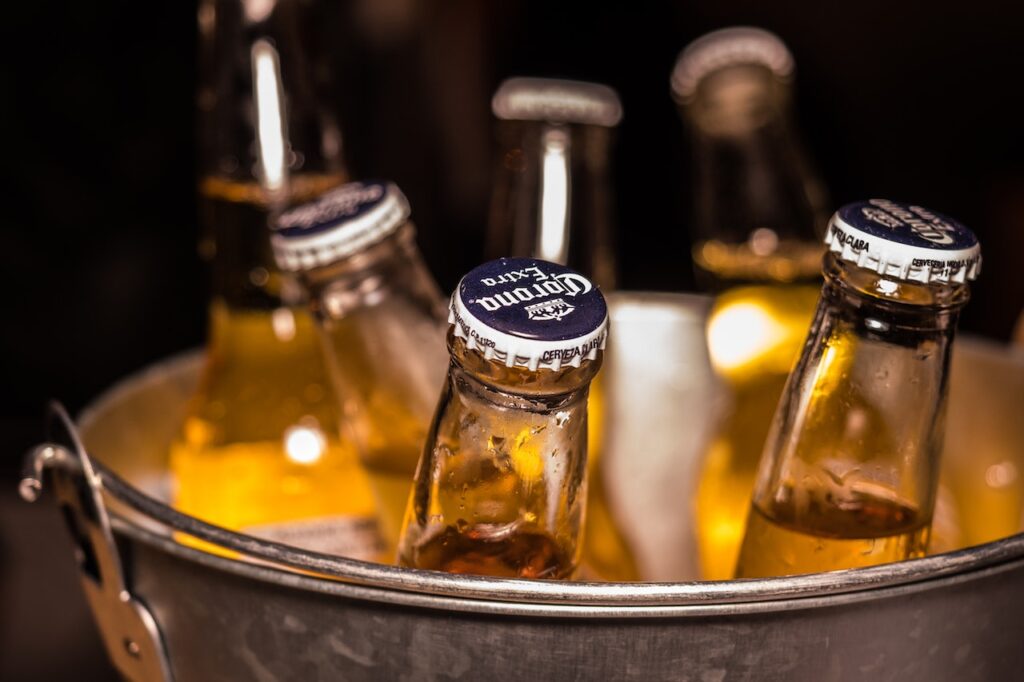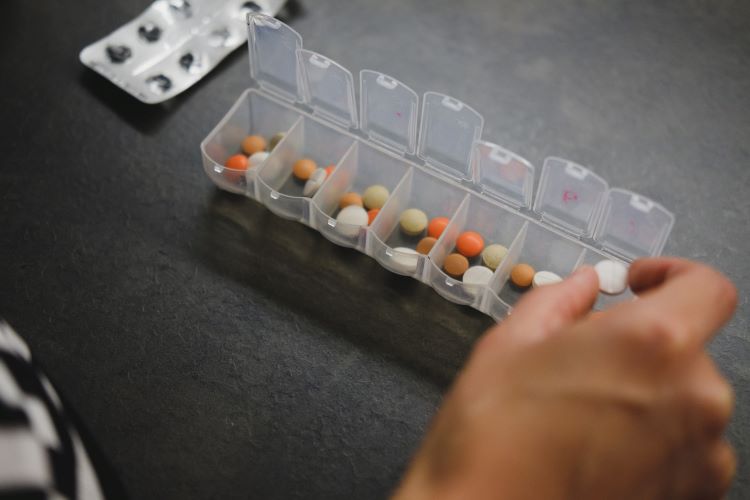In the UK, drinking alcohol is considered a national pass time. From weekend revellers to social events, alcohol is often a popular beverage.
According to the latest statistics, it is estimated that 29.2 million people in the UK drink alcohol each week. In England, it was recorded that 82% of adults drink alcohol each year and 49% of adults drink alcohol each week.
Unfortunately, however, drinking alcohol can lead to serious health issues. (1)
In 2020, in England, there were 280 thousand hospital admissions related to alcohol consumption. For more information about alcohol statistics in the UK, please see here.
One of the illnesses that required medical attention was alcohol-related ulcers.
The purpose of this article is to discuss alcohol-related ulcers. It will discuss what ulcers are, how they form, what causes them, and how they are treated.
What Is an Ulcer?

Stomach ulcers, medically known as gastric ulcers, are sores that form on the lining of the stomach.
Ulcers can also form in the intestine – just beyond the stomach. These are known as duodenal ulcers.
Both duodenal and stomach ulcers are also known as peptic ulcers.
The most common cause of ulcers is infection.
This can be caused by a build-up in a bacterium, such as Helicobacter pylori (H. pylori) or irritation caused to the stomach by anti-inflammatory drugs, such as ibuprofen.
Despite popular beliefs, things such as stress and spicy food do not cause peptic ulcers to form.
However, they can irritate your stomach and make ulcers worse. (2)
What are the Risk Factors and Symptoms of Ulcers?

Although the main causes of ulcers are bacterium and anti-inflammatory drugs, several things can lead to a person being more at risk of developing an ulcer.
These include:
- Gender – studies have found that, proportionally, women are more at risk of developing ulcers than men.
- Age – older people are more likely to develop an ulcer than young people. In particular, people over 70 are considered high-risk.
- Having previously had an ulcer – people that have had ulcers are more at risk of getting them again.
- People that regularly use medication – in addition to anti-inflammatory drugs, other medications have been linked to ulcer formation, such as corticosteroids.
- Genetics – people that have a family history of ulcers are more at risk of developing an ulcer
- Alcohol consumption – consuming alcohol, particularly for heavy drinkers, can increase the person’s chances of developing an ulcer.
- Smoking tobacco – tobacco can irritate the stomach and lead to ulcers.
According to some studies, some ulcers can be symptomless. However, commonly reported symptoms include:
- Weight loss
- Severe stomach pains, sometimes lasting from days to weeks
- Stomach pains whilst eating
- A burning sensation in the stomach
- A loss of appetite
- Nausea and vomiting
- Indigestion and heartburn
- Bloating
- In more serious cases, blood in stool
If people are experiencing any of these symptoms, it is recommended that they speak with a medical professional, such as a GP. (3)
How Does Alcohol Cause Ulcers?

The link between alcohol and ulcer formation is somewhat unclear.
Studies suggest that alcohol itself cannot lead to the formation of ulcers. However, alcohol is a risk factor that can contribute to someone developing an ulcer.
To elucidate, alcohol cannot create an ulcer, but it can irritate and damage the stomach lining – which can increase the chances of developing an ulcer.
This is particularly true for people that are considered heavy or binge drinkers.
In the UK, this refers to women that consume 8 or more alcoholic drinks per week and men that consume 15 or more alcoholic drinks per week.
Further, when alcohol is combined with other risk factors, this can also significantly increase the chance of ulcer forming.
For example, this might include:
- Drinking whilst using medication
- Drinking and smoking tobacco
- Drinking when you have a family history of ulcers
Alcohol will also make ulcers worse and can perpetuate ulcer-related symptoms.
Drinking too much alcohol can lead to gastritis (stomach inflammation) and heartburn (acid reflux) – both things that can lead to ulcers and increased ulcer symptoms. (4)
In addition, heavy drinking whilst having an ulcer can lead to serious health issues, such as the stomach:
- Shrinking and atrophy
- Bleeding
- Serious damage to the stomach lining
- Inflammation
Are Ulcers Dangerous?

The answer to this, generally, is no. In most cases, ulcers are easily treatable and will eventually go.
However, ulcers can lead to some serious health issues that can be life-threatening.
One potential complication is internal bleeding. This happens when an ulcer forms at the site of a blood vessel.
The result of this can be two-fold: long-term bleeding or severe bleeding.
The former can lead to anaemia, which can lead to heart palpitations, shortness of breath, and fatigue.
The latter is more serious and can lead to vomiting blood and black and sticky stool.
Perforation is another potential complication. This is when the stomach lining splits open.
This can lead to peritonitis – an infection in the lining of a person’s abdomen. This has the potential to allow infection to spread into the blood (sepsis).
As a result, this could lead to organ failure and be potentially life-threatening.
A final complication is gastric outlet obstruction. This refers to an inflamed or scarred ulcer.
This can result in people not being able to digest food properly.
This can lead to vomiting, bloating, and feeling very full after eating. (5)
How are Ulcers Treated?

How an ulcer is treated will depend on what the medical professionals deem to have caused it.
Ulcers that form as a result of the bacterium are usually treated with antibiotics.
These antibiotics will kill any bacterium that has led to the ulcer.
Ulcers that might have formed as a result of anti-inflammatory drugs are usually treated using Proton Pump Inhibitors (PPIs).
PPIs reduce stomach acid. This prevents the acid from further irritating the ulcer and allows it to heal.
In most cases, ulcers usually heal between 1 to 2 months. However, there are some factors to consider.
For example, as mentioned, certain things will irritate ulcers and make the healing process slower.
Stress, spicy food, and alcohol are all things that can prevent ulcers from healing quickly.
In some more serious cases, and when the aforementioned treatment does not work, people will need to undergo surgery. (6)
How Can I Prevent Ulcers if I Drink?

In simple terms, the best way to avoid ulcers is to not drink and to live a healthy lifestyle.
Generally, the occasional drink will not do any harm. However, as mentioned, excess drinking can be a risk factor.
If the person is a heavy drinker, trying to cut down will help. However, if the person suffers from alcohol addiction, it would be wise to seek professional help (more on this below). (7)
Living a healthier lifestyle will also help.
Exercise will help reduce the stress that can lead to ulcers. In addition, eating well and being conscious of food consumption can reduce the likelihood of ulcers developing.
Avoiding eating a lot of spicy and acidic food is a good place to start.
Other foods to moderate include:
- Chocolate
- coffee
- Citric fruit, such as lemons
- Curries
- Fast food that has a high-fat content
- Peppers
- Tomatoes
Food that is good for ulcers includes:
- Whole grains
- Lentils
- Avocados
- Green beans
- Nuts
- Bananas
- Watermelon
- Peaches
- Apples
- Pears
Getting Help for Alcohol Use

For people looking to get help with their alcohol intake, there are many excellent, free options available.
The UK is home to many great alcohol services, such as SMART Recovery, FRANK, and Alcoholics Anonymous (AA).
People will also find many local alcohol services that are easy to access.
To find one of these free services, please follow this link.
These organisations will offer services, such as:
- Alcohol detox support
- 1-to1 therapy
- Group Therapy
- Information and advice regarding alcohol
- Help to access treatment
- Aftercare
It is also advised that people speak with their GP or a key worker. They will be best able to assess individual needs and help people access treatment.
For example, the NHS offer outpatient treatment§ for those that need rehabilitation.
Unfortunately, private rehab is not free (usually £300 to £500 per day) and cannot be accessed via the NHS.
The NHS does provide funding for rehab, however, and people should speak with their GP if this is a desired option. (8)
References
(1) Wadd, Sarah, and Chris Papadopoulos. “Drinking behaviour and alcohol-related harm amongst older adults: analysis of existing UK datasets.” BMC research notes 7, no. 1 (2014): 1-9.
(2) Sverdén, Emma, Lars Agréus, Jason M. Dunn, and Jesper Lagergren. “Peptic ulcer disease.” Bmj 367 (2019).
(3) Rosenstock, S., T. Jørgensen, O. Bonnevie, and L. Andersen. “Risk factors for peptic ulcer disease: a population-based prospective cohort study comprising 2416 Danish adults.” Gut 52, no. 2 (2003): 186-193.
(4) Andersen, Inger Bak, Torben Jørgensen, Olaf Bonnevie, Morten Grønbæk, and Thorkild IA Sørensen. “Smoking and alcohol intake as risk factors for bleeding and perforated peptic ulcers: a population-based cohort study.” Epidemiology (2000): 434-439.
(5) Bertleff, Mariëtta JOE, and Johan F. Lange. “Perforated peptic ulcer disease: a review of history and treatment.” Digestive surgery 27, no. 3 (2010): 161-169.
(6) Kavitt, Robert T., Anna M. Lipowska, Adjoa Anyane-Yeboa, and Ian M. Gralnek. “Diagnosis and treatment of peptic ulcer disease.” The American Journal of Medicine 132, no. 4 (2019): 447-456.
(7) Malfertheiner, Peter, Francis KL Chan, and Kenneth EL McColl. “Peptic ulcer disease.” The Lancet 374, no. 9699 (2009): 1449-1461.
(8) UKATT Research Team. “Effectiveness of treatment for alcohol problems: findings of the randomised UK alcohol treatment trial (UKATT).” Bmj 331, no. 7516 (2005): 541.





